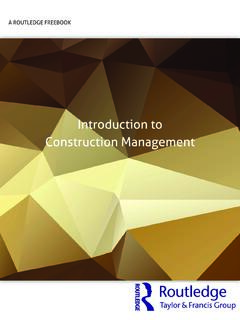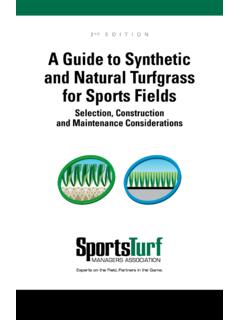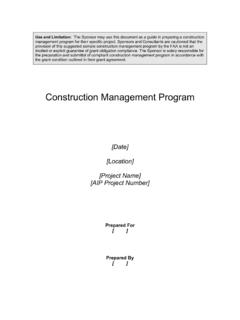Transcription of CONSTRUCTION SITE GUIDELINES FOR HOUSEHOLDERS …
1 CONSTRUCTION SITE GUIDELINES FOR HOUSEHOLDERS AND DEVELOPERS This document has been prepared as a guide for homeowners, builders, site managers and workers to good practice during CONSTRUCTION work. It is hoped that the inevitable inconvenience of building can be limited through sensible arrangements which acknowledge the needs of contractors but also respect the quality of life of neighbours. It is important in every case to inform neighbours or local residents in the vicinity of any proposed works in advance, keep them advised of progress, and provide contact details. It is suggested that you provide the contact details of one person (which could be the contractor s project manager or you) who will deal with queries and problems.
2 Pre-warning of works will usually avoid confrontations and complaints later on and maintain good relations locally. The London Borough of Barnet runs a Considerate Contractor Scheme which encourages contractors to maintain a good standard of work. LEGAL CONTROLS The Town and Country Planning Act 1990 permits the planning authority to attach conditions to planning decisions and it is a requirement to fully comply with any conditions imposed. The council actively enforces non-compliance of relevant planning conditions so it is important to ensure that these are considered carefully and addressed prior to any development commencing.
3 The Control of Pollution Act 1974 and Environmental Protection Act 1990 places specific duties on building contractors to ensure that noise, smoke and dust is kept to a minimum. The Council also actively enforces the requirements of this legislation. Its Environmental Health Section imposes certain restrictions and conditions on working hours, methods of work and type of equipment used to ensure noise levels are kept to an acceptable level. Where necessary, notices will be served to require alternative working methods or preventative measures. Whilst planning permission gives you authority to build you are reminded to check if any other consents are required, such as building regulation approval or highway works licences prior to starting work.
4 Any damage to the public highway caused by traffic movement and skip parking will be required to be made good. PARKING AND TRAFFIC A great deal of ill-feeling is often caused by contractors and their staff occupying parking spaces normally used by residents. The Council has no powers to prevent this but it is within the power of contractors to avoid or reduce this problem by encouraging staff intent on commuting by car to park further away and by seeking, as far as possible, to stagger deliveries. Before starting work, it is suggested that you make it clear to your contractors what the existing parking arrangements are locally and ensure that all staff respect this.
5 Similarly equipment and portable toilets should not be left or used from the roadside. Neighbouring residents will normally accept temporary interruptions of access during major deliveries of concrete, materials etc. Ensure that vehicles do not block paths and roads/highways and contractors do not leave their vehicles engines running whilst they are stationary (unless this is necessary for hydraulics work). PERMITTED HOURS OF WORK The permitted hours of work when noise can be audible at a CONSTRUCTION site boundary are: MONDAY TO FRIDAY 8:00am to 6:00pm SATURDAY 8:00am to 1:00pm SUNDAY AND BANK HOLIDAYS No work allowed Any noisy operations outside these hours cannot be undertaken without prior approval of the Environmental Services department and permission is only granted in exceptional circumstances, emergency works, in which case the Environmental Health Section should be contacted as soon as possible.
6 NOISE & VIBRATION GENERAL Noise and vibration must be kept to a minimum by methods of work that conform with the Code of Practice for Noise and Vibration Control on CONSTRUCTION and Open Sites (See BS 5228 Parts 2 and 4: 1997, and EC and UK Noise Legislation, as applicable). At all times the best practicable means as defined in the Act must be employed to reduce noise. Only the quietest plant or machinery should be used, and all equipment should be maintained in good mechanical order and fitted with appropriate silencers, mufflers or acoustic covers. Stationary noise sources should be sited as far away as possible from neighbouring properties.
7 Acoustic barriers consisting of site materials such as bricks, earth mounds or proprietary types should be constructed when noise cannot be sufficiently reduced by careful siting of noise sources. Piling should be carried out by methods causing minimum noise and vibration. All workers on site must be made aware of the need to keep noise and disruption to a minimum from building works, equipment, plant and machinery, radios, music, vehicles or any other sources. The movement of vehicles to and from the site must be controlled to minimise noise and disturbance to nearby residents. SMOKE Before works start precautions should be taken to prevent smoke on site from machinery, vehicles or combustion.
8 Bonfires are not permitted. Petrol and diesel engines used to power equipment and plant should not emit dark smoke once the running temperature of the engine has been reached, and should be regularly checked and maintained to prevent smoke and fumes. DUST/DEBRIS Prevention measures should be taken to minimise the formation and spread of dust and dirt. Dust should be controlled at source by a continuous fine water spray. To ensure that this is done an adequate water supply must be provided, with sufficient hoses to reach all parts of the site with a means of disposal of waste water.
9 The wheels of CONSTRUCTION vehicles should always be cleaned before exiting a building site. A good guidance document is The Control of Dust and Emissions from CONSTRUCTION and Demolition - Best Practice Guidance -London Councils November 2006. PROTECTION OF TREES Any works to or close to trees and hedgerows must be carefully planned to ensure no harm is caused. Further advice is available from the planning department s trees and landscaping team. FURTHER ADVICE You can get further information or advice by visiting the councils website at Or contacting the Planning Department or Environmental Services, Building 4, North London Business Park, Oakleigh Road South, London, N11 1NP.
10 Tel: 020 8359 2000.









